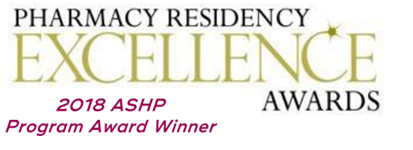PGY1 Pharmacy Residency
Methodist University Hospital offers an ASHP-Accredited PGY1 residency that typically accepts 7 residents annually. The purpose of the program is to provide the resident with the skills, knowledge & attitudes required to become a competent pharmacy practitioner.

At the end of the residency, all program participants are expected to:
- Provide pharmaceutical care in multiple settings, applying evidence-based knowledge
- Maintain independent learning skills
- Possess a professional ethic
- Develop effective communication skills
- Cultivate confident leadership skills
- Understand research methods & opportunities
- Take responsibility for evaluation of one's work
- Provide effective drug education to others
- Understand & participate in the medication use improvement system
- Improve the drug distribution system
- Assume personal responsibility for effecting change through involvement in multidisciplinary & intradepartmental teams
The program is a 52-week experience composed of six major elements:
- Direct Patient Care
- Service
- Practice Management
- Practice-based Research
- Medication Safety & Policy
- Transitions of Care
In addition to the learning experiences outlined on the following pages, residents are also able to participate in several learning opportunities meant to complement their clinical learning experiences. These include the Pharmacy Residency Education Series (PRES), which includes topics on clinical, operational, leadership, & research subjects, & the University of Tennessee Teaching & Learning Program.
Mentorship
Each resident selects a facilitator from among the group of preceptors to advise them throughout the year. The facilitator assists the resident in tailoring learning experiences to his or her goals, interests, & previous experiences. The facilitator may also guide the resident as they select their research project, identify preceptors to assist them with presentations & direct them in career choices.
Learning Experience Structure
To attain the core level of knowledge necessary to function as a well-rounded pharmacy practitioner, each resident will participate in a variety of 4-week learning experiences. While core rotations are required learning experiences, residents may choose one of the selective options from each subspecialty. Residents receive 3 additional elective rotations and any rotation not chosen as a selective may be chosen as an elective.
| Core Rotations | Selective Rotations |
| Orientation | Critical Care Selective (Medical ICU or CVICU/CT Surgery) |
| Internal Medicine | Immunocompromised Selective [Transplant Nephrology, Transplant Surgery (Liver) or Hematology/Oncology Clinic] |
| Pharmacy Administration and Leadership | Internal Medicine Selective (Acute Stroke, Nephrology, or Cardiology) |
| Transitions of Care | Acute Care Selective (Emergency Medicine or Neurocritical Care) |
| Elective Rotations | |
| Infectious Disease/Antimicrobial Stewardship | Medical ICU |
| Medication Safety | Neurocritical Care |
| Pediatrics (LeBonheur Children’s) | CVICU/CT Surgery |
| Hepatology | Emergency Medicine |
| Internal Medicine 2 | Transplant Nephrology or Transplant Surgery (Liver) |
| Cardiology | Hematology/Oncology Clinic |
| Nephrology | Acute Stroke |
Longitudinal Learning Experiences
In addition to rotation requirements outlined above, PGY1 residents will also be required to complete the following longitudinal experiences:
- Medication Safety & Policy: Residents are required to complete a three-month learning experience in medication safety & policy. The resident will gain practical experience in drug information, formulary & drug use policy management, medication safety, literature analysis, & integration of service throughout a multihospital system. Residents are responsible for completing one major comparative medication review or an abbreviated medication use evaluation (MUE) during the experience. Residents are also responsible for two minor projects and may vary based on the current needs of the system. These projects may include a protocol review, drug shortage plan, policy review, or other projects as deemed necessary.
- Medication-Use Evaluation: MUH operates a "flipped" MUE process. Incoming residents are assigned to MUE topics that were identified and written up during the previous year. A preceptor is assigned to the MUE to help oversee the activity. Residents will work to design a data collection form, collect pertinent information, analyze the results, determine conclusions of appropriate or inappropriate medication use and make recommendations to improve medication use. Results will be presented by the residents to the Pharmacy & Therapeutics Committee, and abstracts will be submitted to ASHP for presentation at the Midyear Clinical Meeting. Residents may also present their MUE results at the annual Methodist Research Symposium (usually in April). In the latter half of the year, residents will work to identify topics and complete MUE write-ups for the next class.
- Service & On-Call: PGY1 residents are required to provide service (often referred to as "staffing") coverage the equivalent of every 4th weekend (approximately 26 shifts per year). They provide coverage for 2 evening shifts out of every 4-week schedule (approximately 26 shifts per year) and on-call for approximately 6 weeks per year.
- Research: PGY1 residents are required to complete a longitudinal experience related to research, which includes project time during the month of December. Results will be presented at the Mid-South Residency Conference held in the Spring. More information about our residency research process can be found in our residency manual.
- Required Presentations: PGY1 residents are required, at a minimum, to complete 3 primary presentations at various time points during the residency year: a one-hour continuing education presentation, a 30-minute residency conference presentation, and a 30-minute presentation to a physician group.
- Primary Preceptor Experience: each PGY1 resident will complete one experience where they serve as the primary preceptor for a student learner.
Salary
Salary is approximately $47,000 and is paid on a bi-weekly basis.
